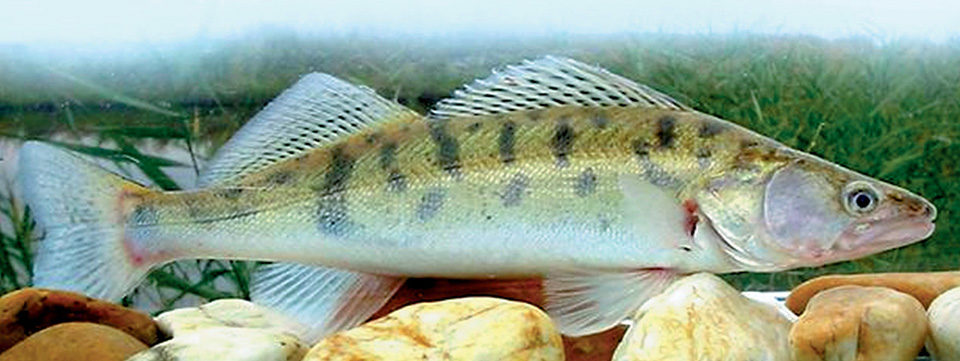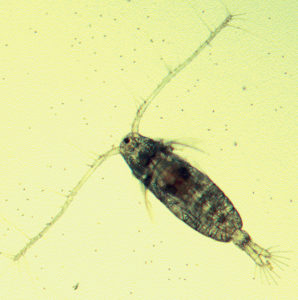Varied researchers help drive industry advances

Aquaculture makes a minor contribution to the annual food production in Germany. Nevertheless, fisheries and the cultivation of aquatic organisms such as fish have a long tradition in the country.
The German aquaculture sector is traditionally based upon the cultivation of freshwater species such as carp and trout. Carp culture has been performed since the 11th century, with a peak during medieval times. Production systems such as extensive earthen ponds are still common, but the industry has been moving toward more intensive production in semi-intensive flow-through systems and intensive recirculating systems.
According to the Food and Agriculture Organization of the United Nations, the total German aquaculture production in 2009 was about 40,000 metric tons (MT). This volume was dominated by the culture of rainbow trout (around 21,000 MT), common carp (around 10,000 MT) and blue mussels (around 4,000 MT). Sturgeons, pike, pike perch and tench, as well as sea trout and other species for restocking purposes, contributed to the remaining production.
An apprenticeship is required for fish farmers to begin operations in Germany. The initial and ongoing aquaculture training is the responsibility of the country’s federal states.
Current production
Aquaculture production in Germany leans toward land-based systems combining different types of production, such as renewable energy like biogas, fish and plant production. This increases resource efficiency and reduces the environmental impacts of the different aquaculture systems.
Production of the African catfish (Clarias gariepinus) by a cooperative of several small fish farmers in Mecklenburg-West Pomerania reached almost 1,000 MT in 2011. Another remarkable project is the construction of a land-based mariculture system in Völklingen, Saarland, which is close to the borders to France and Luxembourg.
When it begins operations this year, the system’s designated annual capacity will be 500 MT of fish. On a global scale, it will be one of the first marine land-based systems without any connection to adjacent seawater. A prerequisite of such a system is the development of reliable, cost-effective water treatment to ensure consistent water quality during the production process.
Aquaculture research in Germany
There is no single authority responsible for the control and further development of aquaculture in Germany. Administrative control is under state authority, and research activities are organized by many decentralized institutions.
Applied research is performed by entities like the Bavarian State Research Centre for Agriculture, the Institute for Fisheries, the Saxonian State Institute for Agriculture, the Institute for Fisheries of the State Research Centre for Agriculture and Fisheries Mecklenburg-West Pomerania. Academic institutions such as the Bremerhaven University of Applied Science/Institute for Marine Resources and University of Applied Sciences Saarland are also involved. Basic research funded by federal, state and other governmental programs is performed at the University of Rostock in Mecklenburg-West Pomerania; the University of Kiel in Schleswig-Holstein; and the University of Göttingen in Lower Saxony.
So far, four professorships in Germany focus on the education of master’s students. Their main research interests are new offshore aquaculture systems (Bremerhaven University of Applied Science); the development of recirculating aquaculture systems (University of Applied Sciences Saarland); and feed ingredients, feed requirements and the physiology of aquatic organisms (University of Kiel).
With a main research focus on aquaculture in tropical and sub-tropical regions, the University of Hohenheim (Baden Württemberg) is examining increased production from integrated rice/fish culture systems and the substitution of plant proteins for fishmeal in feed. The University of Rostock is studying parasites and diseases of cultured organisms, the utilization of live feed for fish larvae and the development of new polyculture systems.
Aquaculture education at University of Rostock
The Aquaculture and Sea Ranching professorship at the University of Rostock focuses on a range of aquaculture-related topics. These topics include the investigation of alternative prey organisms as live feed, parasites and fish disease control. The environmental impacts of open mariculture systems as well as research on land-based recirculating aquaculture systems and aquaponic systems are also addressed.
The university’s aquaculture program is the first master’s-level study program in Germany that provides an entire curriculum on aquaculture and related subjects. The program also involves material on law, mechanical engineering, math and economics. It has three semesters of lectures, seminars and practical activities, followed by an internship and master thesis.
Current research

Current research projects involving these students focus on methods to improve resource efficiency and therefore aquaculture production. One project studies the use of alternative high-quality prey organisms for larviculture in combination with a new cultivation system. This method will be compared to traditional methods that apply live feed organisms, such as Brachionus species and Artemia salina.
The culture of pike perch (Sander lucioperca) is one of the strategic research topics in Mecklenburg-West Pomerania. In 2011, research and production of pike perch were begun. However, research concerning the larval stages and weaning process of pike perch is still required.
A new project at the University of Rostock funded by the European Fisheries Fund is investigating local copepod species that are adapted to brackish water conditions as candidates for the cultivation of pike perch larvae. A bioreactor system that uses simplified food chains containing microalgae and copepods will be developed. This live feed is planned to continuously supply the fish larvae their nutritional requirements for a period of several days to weeks.
Research on optimized conditions for the bioreactor system includes maximized copepod production rates as well as feed quality aspects like biochemical composition and improved multispecies systems. Additionally, there is a focus on technical solutions for the application of the bioreactor systems under practical conditions in applied aquaculture facilities.
This research on rearing pike perch is conducted in close cooperation with the State Research Centre for Agriculture and Fisheries Mecklenburg-West Pomerania at its facilities in Born and Hohen Wangenlin.
Further aquaculture research projects investigate the cultivation of commonly used crustaceans in recirculating systems as potential culture candidates for land-based systems combined with alternative nutritionally efficient water treatment processes.
(Editor’s Note: This article was originally published in the July/August 2012 print edition of the Global Aquaculture Advocate.)
Authors
-
Dr. Adrian A. Bischoff
Aquaculture and Sea Ranching
Faculty of Agricultural and Environmental Sciences
University of Rostock
Justus-von-Liebig-Weg 6
18059 Rostock, Germany -
Biol. Claudia M. Wranik
University of Rostock
Rostock, Germany -
Dr. Christina B. Augustin
University of Rostock
Rostock, Germany -
Prof. Dr. Harry W. Palm
Head, Aquaculture and Sea Ranching Group
Faculty of Agricultural
and Environmental Sciences
University of Rostock
Rostock, Germany
Tagged With
Related Posts

Innovation & Investment
Aquaculture Exchange: Barry Costa-Pierce, UNE
University of New England Professor Barry Costa-Pierce says aquaculture is often neglected in studies examining ocean health and ecosystem and resource management. The “Ocean Prosperity Roadmap” released this summer, he said, was more of the same.

Innovation & Investment
Aquaculture Exchange: Carsten Krome, Alimentos Ventures
A business accelerator helps small businesses grow and ready themselves to capitalize on institutional investment opportunities. Sounds exactly what the aquaculture industry needs. Carsten Krome tells the Advocate about the various business models his new firm is investigating.

Innovation & Investment
AquaBounty, with new RAS facility, hopes to win public support for GM salmon
Ron Stotish, CEO of AquaBounty Technologies, believes genetically modified salmon is no threat to its opponents and the outlook for AquAdvantage is good. With its purchase of the Bell Fish Co. RAS facility, commercialization will soon commence.

Innovation & Investment
When Perch Met Pale Ale: A nothing-goes-to-waste love story
A unique joint venture is bringing a land-based recirculating aquaculture system to a farming community near Lake Erie. It’s a wastewater treatment program that aims to provide a sustainable food source for the local community.


